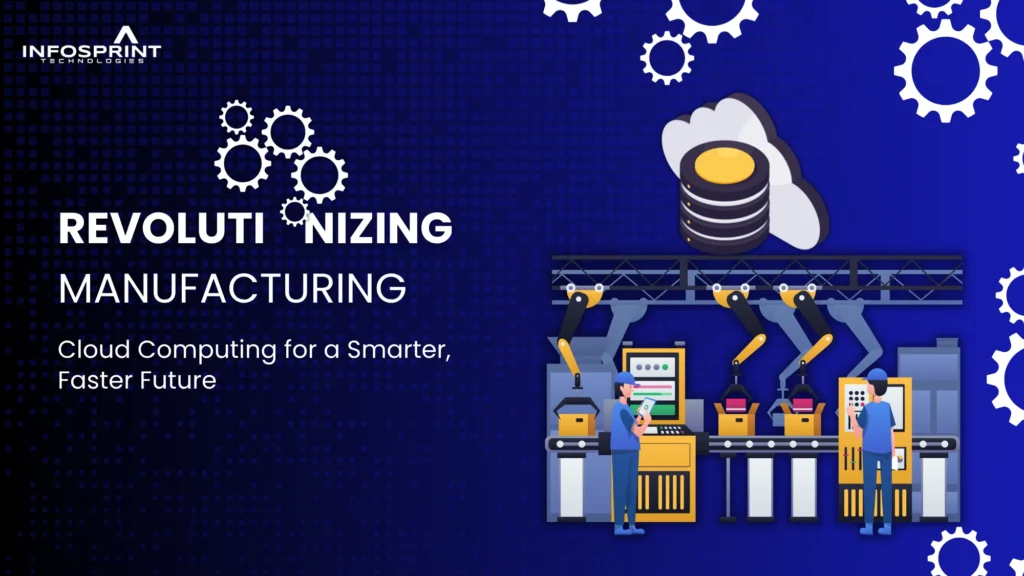The Role of Cloud Computing in the Future of Manufacturing

Is your factory future-proof? If not, cloud tech might be your golden ticket.
Manufacturing plays a major role in shaping a country’s economy. In 2023, U.S. manufacturing contributed 10.3% to the national GDP. India, a growing industrial powerhouse, clocked in at 13%. As competition intensifies and global supply chains tighten, American manufacturers are leaning hard into digital transformation. And at the core of that shift? Cloud computing.
From Detroit’s auto plants to Texas’s electronics factories, American manufacturers across the Midwest, South, and Rust Belt are leveraging cloud tech to stay ahead in a fiercely competitive market
According to the latest industry data, the US cloud infrastructure services market is currently valued at a whopping $52.8 billion in 2025 and is projected to reach $165.2 billion by 2034. That’s not just impressive growth—that’s a seismic shift in how manufacturing operates.
The cloud is the engine powering smart factories, predictive analytics, real-time operations, and the digital transformation of mass manufacturing. We break down how cloud tech is modernizing U.S. manufacturing, what it offers, and what you need to watch out for.
What is cloud computing in manufacturing?
Cloud computing = scalable on‑demand access to servers, storage, databases, networking, apps, analytics—all without owning the hardware. It’s like Netflix for your data and compute power. Manufacturers plug in via AWS, Azure, GCP, and get instant access to AI/ML, IoT backends, big data, and more. Want to automate quality control, monitor machine health, or spin up a new production line overnight? The cloud’s got your back.
Think of it this way: Remember when factories needed massive on-site server rooms with dedicated IT staff just to run basic operations? Those days are going the way of the floppy disk—or dial-up internet. Today’s smart manufacturers are ditching the hardware headaches and tapping into scalable cloud resources that grow with their needs.
Just as Henry Ford revolutionized assembly lines in the early 20th century, today’s manufacturers are embracing the cloud to drive the next wave of American innovation.
As one manufacturing exec from Michigan recently put it: “We used to spend weeks planning for IT capacity. Now we scale up or down on the fly. It’s like going from a fixed-gear bike to a Tesla.”
Importance of cloud computing in manufacturing:
Companies ‘ digital transformation is rising exponentially with AI, ML, IOT(Internet of Things), and blockchain. Cloud computing is integrated into companies from various industries because of its enormous benefits and significance. According to India brand equity foundation statistics, cloud computing in manufacturing is said to expand the market to 111.90 billion USD. The importance of the cloud in manufacturing expands to:
Digital transformation is imminent and will significantly impact all industries. With digitalization, the amount of data generated will be enormous, and companies must develop strategies to deal with it. Implementing cloud computing will help companies store and retrieve data when necessary.
Cloud importance is not restricted to only storing and retrieving data. It increases the efficiency of manufacturing operations by analyzing real-time data, monitoring machinery health and potential failures, and providing seamless cross-communication collaborations for decision-making.
Cloud-based supply chain management helps the laborers track the raw materials by monitoring inventory levels for effective operations. Tracking and monitoring reduce the logistics decision-making of the managers. This prevents stockouts and overstock and enhances just-in-time manufacturing practices.
How the cloud enhances the manufacturing market
The manufacturing industry is transforming tremendously due to cloud computing, increasing efficiency, flexibility, and competitiveness. It is a technology that allows shared access to resources, including servers, storage applications, and services. Cloud computing provides a dynamic platform for manufacturers. Here are some ways the cloud enhances the manufacturing market:
1. Flexibility and scalability:
Cloud solutions offer flexibility and scalability to manufacturers when adapting to market demands or expanding to new markets. Cloud infrastructure can be quickly adapted to meet the needs of growing production lines without significant upfront investments.
2. Collaborations and information sharing:
Remember when collaboration meant endless email chains and file-sharing nightmares? Cloud-based collaboration tools have changed all that. Now, teams can:
- Access the same information regardless of location
- Work on documents simultaneously
- Share production data across departments
- Collaborate with suppliers and customers in real-time
Implementing cloud technology in manufacturing allows for real-time monitoring of production lines from anywhere in the world. This capability became particularly valuable during the pandemic when remote work became necessary even for manufacturing operations.
3. Improving operational efficiency:
Cloud computing’s data analytical tools provide manufacturers with insights into production performance, equipment health, and process efficiency. Manufacturers can anticipate maintenance needs by tracking real-time machine performance with cloud-based predictive analytics. This increases operational efficiency by lowering repair costs, extending the life of the equipment, and reducing unscheduled downtime.
For example, GE Appliances in Kentucky and Tesla’s Gigafactory in Nevada have adopted cloud-powered systems to streamline operations and boost productivity.
4. Enhancing customer satisfaction:
The latest cloud technology in manufacturing incorporates AI and machine learning for predictive maintenance. This technology also enables mass customization, allowing manufacturers to tailor products to individual customer needs without sacrificing efficiency.
With cloud-based systems, manufacturers can:
- Capture customer preferences more accurately
- Adjust production specifications dynamically
- Deliver customized products at near-mass production costs
- Provide better visibility into order status and delivery times
5. Reduce costs:
Let’s talk dollars and cents. The implementation of cloud-based manufacturing solutions typically shows ROI within 12-18 months. Cloud computing eliminates the need for:
- Expensive on-premises servers and storage
- A large IT staff to maintain the infrastructure
- Regular hardware upgrades and replacements
- Overprovisioning to handle peak loads
Instead, manufacturers pay only for what they use, turning capital expenditures into operational expenses and freeing up cash for strategic investments.
Challenges of integrating the cloud in manufacturing
Let’s keep it 100—implementing cloud solutions isn’t all sunshine and rainbows. There are legitimate challenges that manufacturers face when moving to the cloud. The good news? With proper planning, these challenges can be overcome.
1. Data security and privacy:
Manufacturing companies often deal with confidential information, including intellectual property, customer details, and unique product plans. The cloud storage of this data presents security and privacy issues. To safeguard their data from cyberattacks and unauthorized access, manufacturers need to be sure that their cloud provider has robust security features, including encryption, multi-factor authentication, and frequent security assessments.
2. Integration with Legacy Systems:
Numerous manufacturers still depend on legacy systems for production management, inventory control, and supply chain operations. These machines are critical for the daily functioning of these industries. They provide the backbone needed to keep the company up and running. Integrating these systems with a cloud-ready platform can be difficult, especially if they are designed to work separately. Manufacturers must thoroughly plan their cloud adoption strategy. This is essential to ensure a smooth integration with existing systems and minimize disruptions to production.
3. Reliability and Downtime:
In manufacturing, downtime is the enemy. While cloud providers offer impressive uptime guarantees (typically 99.9% or better), no system is immune to outages. This might require hybrid cloud solutions, which merge cloud-based and on-premises systems. These solutions also might necessitate establishing backup systems to ensure operations continue.
4. Skills Gap:
The shift to cloud computing requires new skills that may not exist in your current workforce. According to industry surveys, 67% of manufacturing companies report difficulty finding qualified personnel to implement and manage cloud systems. Manufacturers might need to invest in training programs that upgrade their employees’ skill sets. They might also have to partner with cloud service providers, which will ensure the expertise required for successful cloud technology adoption.
5. Finding the right cloud service provider:
Manufacturers need to research the best cloud computing company to integrate cloud technologies into their company. Before committing to a cloud provider, a company must assess its goals, budget, security, and future needs. Review the service level agreement of the CSP’s locations and book a demo to check whether their services align with company goals. By following these steps, companies can find the right cloud provider. Even after following these tips and being still confused about the right partner for your company, Infosprint Technologies is an IT service and solutions company that provides various customized cloud solutions tailored to businesses.
Transformation in manufacturing through cloud computing
a) Smart Factories and Industry 4.0:
Industry 4.0 represents the fourth industrial revolution, characterized by the interconnection of machines, data, and processes. Cloud computing is the engine that makes this revolution possible.
In smart factories:
- Networked machinery, sensors, and IoT devices generate massive data volumes
- Cloud platforms process this data in real-time
- AI algorithms identify optimization opportunities
- Systems automatically adjust for optimal performance
Leading providers of manufacturing cloud services offer specialized solutions for different industry segments. These solutions are tailored to specific manufacturing processes, from discrete manufacturing to process manufacturing and everything in between.
b) Enhanced collaboration and supply chain management:
Cloud integration in manufacturing allows for seamless data flow between production, inventory, and sales systems. This integration extends beyond company boundaries to include suppliers, logistics providers, and customers.
Benefits include:
- Complete supply chain visibility
- Real-time inventory monitoring
- Optimized production scheduling
- Reduced lead times
- Better supplier performance management
By integrating cloud solutions with partners and suppliers, manufacturers can minimize supply chain interruptions, optimize production scheduling, and react more swiftly to market demand.
c) Real-time data analysis and insights:
Cloud computing has transformed how manufacturers use data. Previously, data was siloed, difficult to access, and often outdated by the time it was analyzed. Cloud solutions provide instant access to production data, which can be analyzed using sophisticated AI and machine learning algorithms.
This data-driven approach helps manufacturers:
- Identify inefficiencies in production processes
- Optimize machine performance
- Reduce energy consumption
- Improve product quality
- Respond quickly to market changes
d) Product life cycle management:
Cloud-based PLM (Product Lifecycle Management) systems have revolutionized how manufacturers manage products from design to retirement. Traditional PLM systems were often expensive, complex, and difficult to deploy across multiple locations. Cloud-based PLM offers a more affordable and flexible alternative.
With cloud-based PLM, manufacturers can:
- Accelerate product design and development
- Enable collaboration across multiple locations
- Access design data in real-time
- Reduce time-to-market
- Improve product quality
- Manage product variations more effectively
Embracing the Cloud-Powered Future of Manufacturing
Cloud computing in manufacturing isn’t just another tech trend—it’s a fundamental shift in how manufacturing operates. Manufacturers who embrace this shift will be well-positioned to thrive in an increasingly competitive and dynamic market.
As we’ve seen, the benefits are substantial:
- Enhanced operational efficiency
- Reduced costs
- Improved collaboration
- Better customer satisfaction
- Increased agility and innovation
But the journey to cloud adoption requires careful planning, the right partners, and a commitment to digital transformation. The challenges are real, but so are the rewards.
For manufacturers looking to stay competitive in 2025 and beyond, the question isn’t whether to adopt cloud computing—it’s how quickly and effectively you can implement it. The future of manufacturing is in the cloud, and that future is now.
Ready to take your manufacturing operations to the next level with cloud computing? Start by assessing your current systems, identifying key pain points, and exploring cloud solutions specifically designed for manufacturing. The cloud revolution is well underway—don’t get left behind.
The good news? You don’t have to figure this all out alone. Whether you’re running a family-owned shop in Ohio or overseeing a large plant in Texas, cloud solutions can help you compete with the best, without breaking the bank. Infosprint Technologies can help you get there.
Related Posts

Top 10 Cloud Computing Technologies to Look Out for in 2025

Consistent Diagnosis: The Cornerstone of Modern Healthcare




